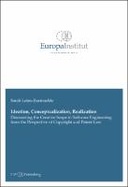Explore

Ideation, Conceptualization, Realization - Discovering the Creative Scope in Software Engineering from the Perspective of Copyright and Patent Law
Sarah Leins
2021
0 Ungluers have
Faved this Work
Login to Fave
Today, the software industry is regarded as one of the most creative and dynamic industries in the world. New, innovative products are constantly being launched, and known established paths for analogue solutions are being challenged and abandoned. Sheltering software through copyright and patent law has been a major point of contention for the past 40 years. A particular difficulty lies in determining the scope of protection in intellectual property law. While the legal framework is highly standardized through several multinational codes, its practical application differs significantly among the various jurisdictions. Economists and lawyers have tried to make the present protection system more balanced and at the same time more efficient. Unfortunately, these analyses often neglect the technical realities – the practicalities and needs of software developers and right holders. The discourse is frequently limited to one particular closed discipline. This doctoral thesis examines the rapidly changing and complex software development market and discusses some pressing legal issues. The aim is to analyse how computer programs are developed and commercialized nowadays, and to evaluate to what extent copyright and patent law are able to reflect these structures. Based on these conclusions, it is then explored what an optimal protection scope for computer programs could look like in copyright and patent law. In 12 expert interviews, technical in-house specialists were questioned about how software companies work today, how they proceed in developing their programs, how they commercialize them through sales and services, and to what extent they use legal measures to protect their software. The results of these qualitative interviews were then evaluated systematically and legally reintegrated. The main achievement of this thesis is to provide the necessary basic scientific research regarding how the software industry works today and how this might affect copyright and patent law. From a legal perspective, it offers novel insights and points of view on existing doctrines. Further, it acknowledges some prevailing trends in the software industry which have so far been largely unaddressed by copyright and patent law. It also discusses possible approaches to how these problems could be tackled in the future.
This book is included in DOAB.
Why read this book? Have your say.
You must be logged in to comment.
Editions

